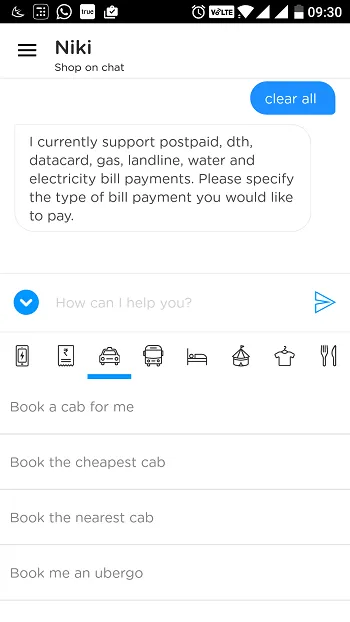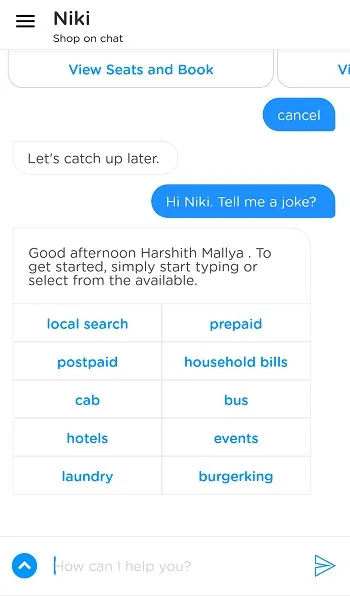[App Fridays] Are machine-human interactions the future of online-commerce? Here is Niki.ai’s attempt at it
While Amazon's Alexa is the shark in the ocean, Niki.ai currently aspires to be the crocodile in the river in the machine-human interaction space.
Global messaging apps like WhatsApp, Facebook Messenger and country-specific leaders like WeChat (China), Line (Japan) and Hike (India) generally see a lot more engagement compared to other non-conversational apps on one’s smartphone. This is based on the premise that chat is one of the most convenient means for casual conversations among two individuals or even among groups.
Can startups and enterprises leverage this trend too and improve the online commerce experience? Niki.ai is a Bengaluru-based startup that uses Artificial Intelligence (AI) to get people to ‘shop on chat’. How effective is it and is 'conversational commerce' the next big thing in e-commerce? Let us explore.

Conversational commerce
E-commerce companies noticed the growing popularity of instant messaging apps, and companies like Flipkart and others like ShopInSync tried to leverage conversational commerce to get people to engage and make purchasing decisions together. This move didn’t work as expected for Flipkart though and the company had to shut down its in-app chat feature, Ping, in June 2016.
The jury is still out though on the best way to get people on the conversational commerce train. Year 2016 saw chatbots becoming mainstream and a new way for companies to interact with customers. While human-to-human online interactions for e-commerce hasn’t seen critical mass, machine-to-human interactions seem to be gaining a lot of steam. Global players like Messenger, Slack, Allo, Skype now allow brands to build conversational-bots on their platforms to better engage with customers.
Closer home in India there are many players in this space. One of them is Niki.ai, backed by Ratan Tata and Unilazer Ventures, and it claims to have seen over 50 million human-machine interactions on its platform across different categories like travel, entertainment, food, home services, utilities like bills and recharges. Founded by Sachin Jaiswal, Nitin Babel, Shishir Modi and Keshav Prawasi, friends and batchmates from IIT Kharagpur, Niki.ai’s long-term vision is to become a ‘smart marketplace for everything.’ Niki was also one of YourStory's Tech 30 2015 companies. Here is a review of the Niki.ai experience.
Methodology
I have been tracking Niki for over a year now and have seen the various iterations of the app. For the purpose of this review I played around with the latest iteration of Niki and their new Software Development Kit (SDK) (more on this later) for over a week. I also compared the experience with other players in this space like Google Allo, Haptik and Tapzo.
Inside Niki’s world
On signing into Niki, users are ushered into a familiar chat-like environment with a ‘Shop on Chat’ header on the top left corner. Niki makes good use of minimalism with simple but elegant pictures to highlight the different categories of services currently on offer. The first option is always a general one(Book a cab for me), while the options below it are more specific in nature(cheapest, nearest etc).

After clicking on a desired option, users can have a back-and-forth conversation with the chatbot- choose from available options, share relevant details and finally make the booking through the chat interface.
Niki leverages Natural Language Processing (NLP) and Machine Learning (ML) technologies on the backend to make the conversation on the front end look seamless and appear like a human-to-human interaction. Like Google Allo, Niki is able to retain context from an ongoing conversation and keep up with the conversation even in case of small typos or short-form words.
The bus booking section is a good test of Niki’s NLP skills. For example, Niki was able to accurately respond back to requests like ‘Book a sleeper bus on the last Friday of March from Bangalore to Mangalore’ and ‘Book a bus on next Friday from Bangalore to Mangalore’ and pick up the correct dates. Niki is then able to keep up with the context for additional requirements like 'Sleeper, AC’, ‘Non-AC’ and other queries regarding time of departure. Or one can enter all the context in one go like below-

As a conversational commerce bot, Niki does a great job for specific use cases and almost feels like a human-human interaction. But there were a few cases I was able to test Niki’s limits and see interesting responses.
1. “Hi Niki. Book me a bus from Bangalore to Mars?”
I tried to employ the famous The Kobayashi Maru test from Star Trek and give Niki an impossible task of trying to book a bus ticket to Mars, to see how she would fare. Without skipping a beat, I was sent on my way to 'Margao'.

On trying again and on replacing Mars with Pluto, Niki was able to detect the anomaly and asked me for a destination.

2. “Hi Niki. Tell me a joke?”
On typing the above request, Niki Just reverts back to its default statement. While I wasn’t expecting Niki to tell me a joke, a response like “I can’t tell you a joke, but I can help you with….” would have been a more natural response.

On the whole, Niki does live up to its promise of letting users ‘shop on chat’, a user interface lot of people are accustomed to. But a chat interface also means one has to type a lot more to reach the end goal. Tapzo, which recently pivoted from a chat-based interface to a tap-based interface, provides a more visual interface but users have to follow a step-by-step booking process in this case. Niki, on the other hand, is able to comprehend slightly complex commands and provide necessary customisations over a chat interface. Each system has its own pros and cons and finally depends on the end user’s taste and need at that moment.
AI for everyone? Creating smaller Niki-powered worlds?
Niki generates revenue through a channel partnership model with its different service providers. Sachin, CEO of Niki, said that their goal is to make AI accessible to everyone, i.e. businesses and consumers, and recently launched a 1MB SDK to let brands enable conversational commerce on their own mobile and web apps. The SDK aims to enable brands enhance their app experience, improve engagement, increase customer retention, acquire new customers and monetise their customer base.
Niki provides a plug-and-play technology that can be easily integrated on different platforms including operating systems, on messaging platforms like messenger, and on the brand’s applications (app and web).
Sachin and Shishir noted that they had been working with select brands on products to deploy the SDK for the last six months. Some of the successful launches include HDFC Bank OnChat, Chat & Pay with Oxigen Wallet, Intex LFTY with leading OEM Intex, among others like bus booking service platform Ticketgoose and home rental service provider Coho.
I was able to test Oxigen's wallet, chat and pay feature and as expected found it to be exactly like Niki’s native app experience, sans a few use cases.

Players like Amazon’s Alexa, Google's Allo are looking to go after the broader conversational commerce market and engage in actual real-world conversations with people. While we may still be far away from the incredible use cases of AI outlined in 2013 science-fiction film Her, a Bengaluru-based startup with lesser resources compared to giants like Amazon and Google seems to be going after a niche use case and making rapid strides in it. Niki.ai’s strategy seems to mirror Jack Ma’s strategy of being a crocodile in the Yangtze River instead of directly taking on a shark in the ocean.
Website- Niki.ai






![[App Fridays] Are machine-human interactions the future of online-commerce? Here is Niki.ai’s attempt at it](https://images.yourstory.com/cs/wordpress/2015/11/yourstory-Niki.jpg?mode=crop&crop=faces&ar=2:1?width=3840&q=75)


